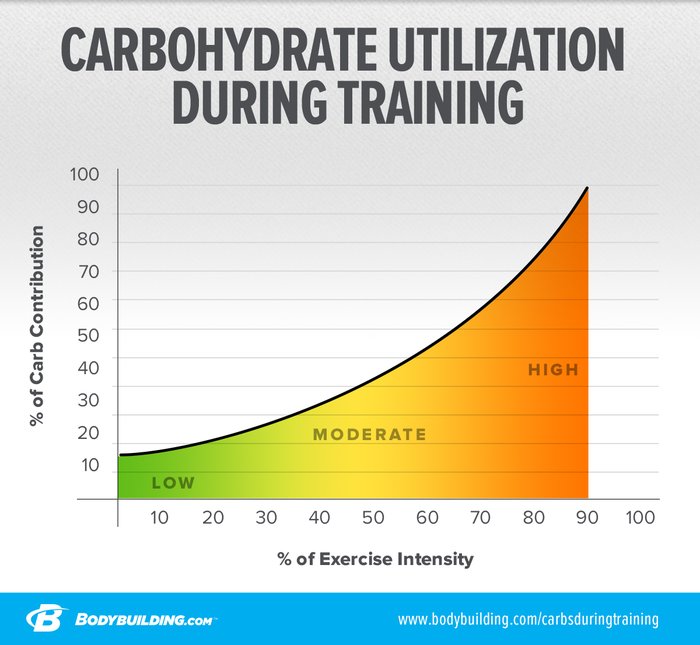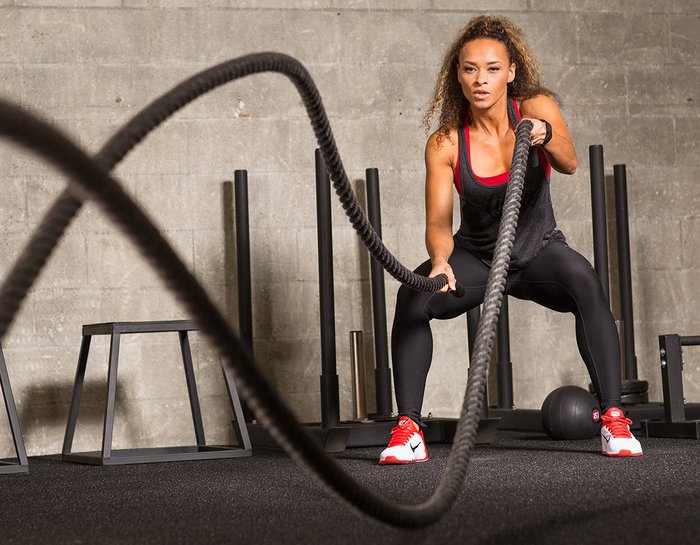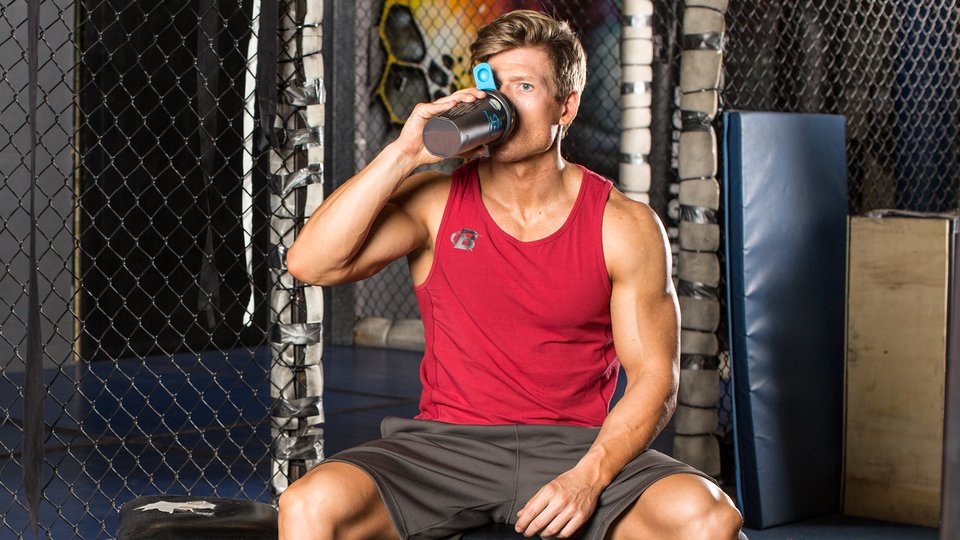If you’ve ever trained hard enough or long enough, you’ve probably run smack-dab into the dreaded “wall of fatigue” during one of your workouts. You know the wall: When you hit it, you feel like you have nothing left to give, everything basically sucks, and you couldn’t possibly complete another set, mile, or even sentence.
The question is, how do you push through this obstacle? Some people double-down on stimulants, which may work temporarily, but that’s really like putting a Band-Aid over a bullet wound. Better pre-workout nutrition can help, but it’s too late for that once your face is tattooed to the wall.
At this point, your best bet to vault that sucker is to add some carbohydrates to your intra-workout shake.
Carbohydrates And Fatigue
Why add carbs to your workout? Because they’re your muscles’ primary energy source. The harder and more intensely you train, the more your body relies on carbohydrates for immediate fuel. This is especially true for anaerobic types of exercise like bodybuilding or powerlifting, because you train in short bursts of high intensity.

When you train at a high intensity, fatigue sets in as you use up the stored carbs (glycogen) in your muscles and your circulating blood glucose. If you begin a workout with a depleted tank, or one that’s just partially full, you’ll hit the wall even earlier in your training session.
Once you’ve expended a certain amount of muscle glycogen, your body stops trying to free energy from glycogen and circulate glucose and focuses on conserving energy. The result? Increased fatigue, as well as decreased focus, power, and strength.
This is where intra-workout carbs come into play. By adding carbs during a particularly long or arduous training session, you can shift your body’s focus back to using energy rather than conserving it. Keep in mind that it doesn’t matter if your goal is to build muscle or lose body fat. Either way, you can boost your exercise performance by refueling rather than trying to tough it out.
Intra-workout carbs are the secret sauce to make your hardest workouts feel and work better.
The Joy Of Carbs
Intra-workout carbs may be the missing link needed to take your performance and body composition to the next level. Here are four reasons to start drinking them now.
1. Boost Your Performance
Once the reps and sets of any given workout start piling up, your body’s ability to recover between each set starts to diminish. When this happens, your performance can take a hit. If your ability to perform drops, you won’t be able to lift as much total volume in your workout, which may threaten your ability to make gains.
Intra-workout carbohydrate consumption helps provide a rapidly available fuel source, which keeps your energy high for subsequent sets. Rather than stopping short or needing to reduce the weight, you’ll be able to continue working hard.

Drinking carbs during your workout can help to sustain high-level performance.
Having readily available energy will help you do more total work, which is advantageous for both muscle and strength gains because total volume is what drives growth.[1] Half-assing the back end of a workout will result in less total volume being completed, and ultimately limit your potential benefits.
2. Reduce Mental Fatigue
Carbohydrates aren’t just your muscles’ preferred fuel source; they fuel the brain, too. Mental preparation, focus, and awareness of technique are crucial for any exercise, but particularly for heavy compound movements. Low energy availability can result in foggy focus and a decreased ability to safely complete a lift, which is a recipe for failure or injury.
Sipping on carbohydrates throughout a really tough or long workout will help deliver a continuous fuel source to your brain, which may help you avoid mistakes related to mental exhaustion.
3. Reverse Catabolic Processes
Carbohydrate ingestion during prolonged exercise can also blunt the increase in cortisol concentration both during exercise and for up to several hours thereafter. By limiting the catabolic processes cortisol can invoke, and by keeping muscle damage at bay, you’ll recover more quickly and be able to give tomorrow’s workout your all.
4. Enhance Body Composition
When consumed during training, carbohydrates are efficiently utilized for both energy and recovery, which leaves little chance for them to be stowed away as body fat. Just remember that you still need to factor the carbohydrates you consume during training into your total daily intake.
Drink Up
If you decide to try using carbs during a workout—and I think you should!—I’m not suggesting you bring a bowl of pasta to the gym or nibble on a bagel throughout your lift. During a workout, you actually want liquid carbohydrates so that digestion is easy and not bothersome.
Keep it simple with dextrose or your favorite sports-drink powder, and sip on this liquid throughout your workout to reap the many performance-related benefits. For an extra layer of muscle maintenance, consider adding BCAAs or whey protein to the mix.
When To Take Intra-Workout Carbs
There’s an argument in favor of sipping on carbohydrates for a variety of training styles, whether bodybuilding, powerlifting, CrossFit, or endurance activities. Rather than focusing on a specific style of training, I prefer to focus on the specific components of a training session itself: duration, volume, and intensity.
While there will always be exceptions to the rule when it comes to deciding when it’s appropriate to consume carbohydrates during training, there are two primary factors to consider: The length of your training session and the intensity.

During a workout, consume liquid carbohydrates for easy digestion.
Length of training: In most cases, you can benefit from intra-workout carbs if you train for longer than an hour. However, a case can be made for nonstop, high-intensity sessions flirting with the 45-minute mark, too.
Most sessions running any shorter than 45 minutes will be adequately fueled by a pre-workout meal and don’t necessitate intra-workout carbohydrates. Consuming carbohydrates during a short session isn’t detrimental, but you may be better off saving those carbohydrates for real food before or after your workout.
Intensity and volume of training: Volume and intensity don’t necessarily dictate the need for intra-workout carbs as much as they dictate the amount you should consume.
In general, you’ll benefit from carbs more during workouts made up of multiple sets of 6 or more repetitions compared to a workout built on long rest breaks and sets of 3 reps or fewer. However, whether you’re busting out a 60-minute high-volume leg day or a 90-minute powerlifting session, you’ll still benefit from carbs. You might just change the amount you consume.
How Many Carbs To Take
Here’s a simple guide to help you determine how many grams of carbohydrates you should take based on the length of your training session:
Length of Training (minutes)
- Less than 45
- 45-60
- 60-90
- 90+
Amount of Carbohydrates (grams)
- 0
- 15-30
- 30-50
- 50-75
Bear in mind that these numbers are general guidelines. Your size, training style, nutrition, and training goals will play a major role in determining precisely how many carbs you need. Try a few different amounts, and determine what works best for you.
Of course, just dumping sugar dissolved in water into your gut may still not optimize absorption. Adding too much sugar can impair the digestion process. To make sure you can tolerate the carbohydrates you’re consuming, you want your mixture to contain a 6-8 percent carbohydrate concentration, or 15 grams per 8 ounces of fluid.
A higher percentage—or carb-heavy beverage—will actually work against you by slowing down digestion, which may lead to GI distress and an uncomfortable training session.
Carbohydrates
- 15 g
- 30 g
- 45 g
- 60 g
Water
- 8 oz
- 16 oz
- 24 oz
- 32 oz
Now carb up and crush your goals! The wall of fatigue’s got nothing on you.
